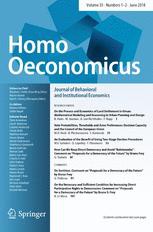Vote Probabilities, Thresholds and Actor Preferences: Decision Capacity and the Council of the European Union

This paper studies how voting rules affect the ease with which decisions are made, basing the analysis on the key premise that ideology makes some coalitions more likely to form than others. Our study focuses on the Council of the European Union (EU), where member states hold different voting weights and ideological positions are strongly linked to the affiliation of actors to political parties. Accordingly, to explore the influence of ideology on the probability of coalition formation, and to thus formulate a ‘decision probability’, we incorporate ideological positions in the analysis of efficiency of the voting system. For the case of the EU, we particularly consider the transition from the triple-majority voting system of the Nice Treaty to the double-majority system incorporated into the Lisbon Treaty. The standard assumption that member states vote independently and affirmatively with a probability of 0.5 leads to a more pessimistic view of the Council’s decision-making capacity than does the premise that member state votes are biased towards voting with the Council majority. The latter assumption is supported by voting data and anecdotal evidence on the ‘consensus-seeking’ culture in the Council. Hence, this paper offers some insights into the ‘efficiency’ of the decision-making process, given institutional voting rules, in combination with actual actor ideological positions.



